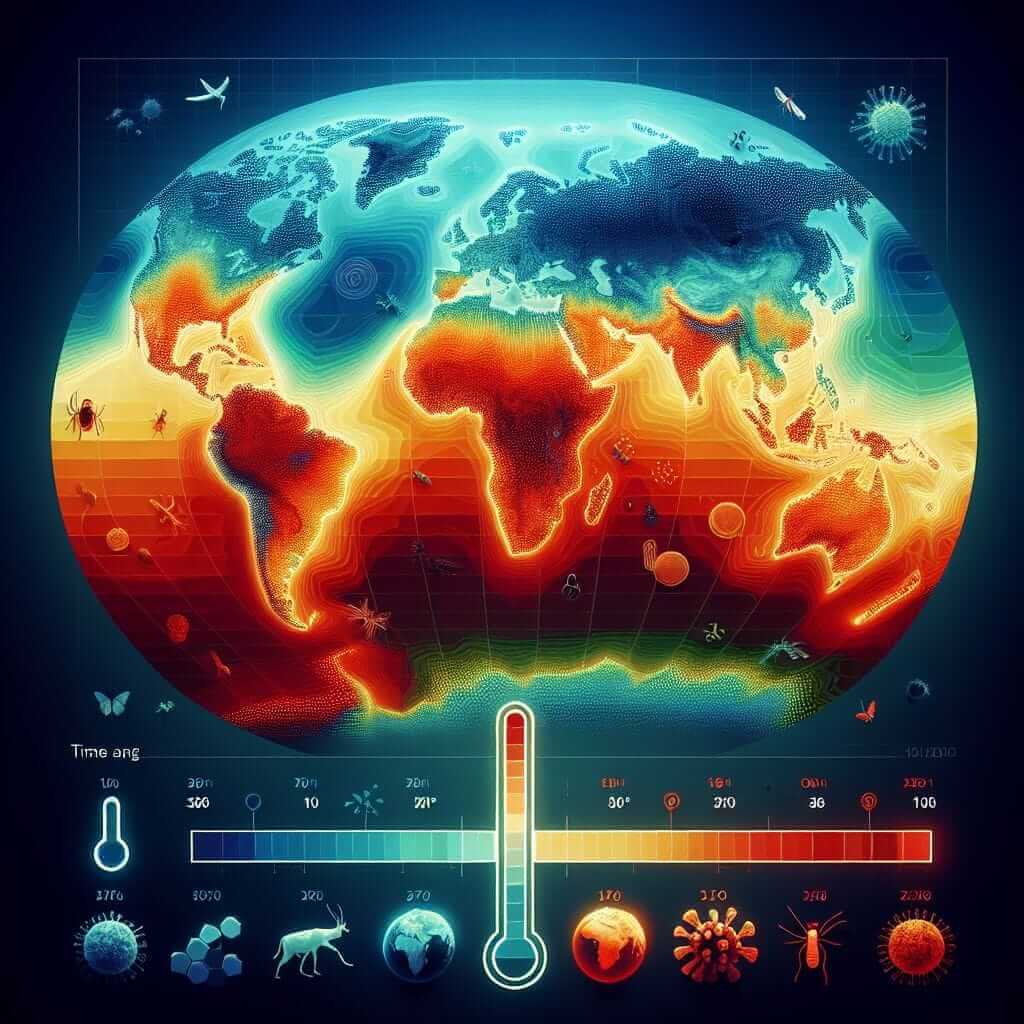The IELTS Reading test is a crucial component of the IELTS exam, assessing your ability to understand and interpret a variety of texts. With climate change being a prevalent topic in recent years, it frequently appears in IELTS Reading passages. This article examines how climate change is affecting the spread of vector-borne diseases, a topic that not only has global importance but also significant relevance to the IELTS Reading section.
Reading Passage: The Influence of Climate Change on the Spread of Vector-Borne Diseases
Read the following passage carefully about how climate change influences the spread of vector-borne diseases.
Passage
The Escalating Impact of Climate Change on Vector-Borne Diseases
Climate change refers to significant changes in global temperatures and weather patterns over time. Although climate change is a natural phenomenon, scientific evidence strongly indicates that human activities, particularly the emission of greenhouse gases, are accelerating this process. The consequences of climate change are multifold, and one of the areas of concern is the spread of vector-borne diseases.
Vector-borne diseases are infections transmitted to humans and animals through vectors such as mosquitoes, ticks, and fleas. Examples include malaria, dengue fever, and Lyme disease. The influence of climate change on these diseases is profound. As temperatures rise, many vectors thrive, extending their geographic range and increasing the incidence of diseases.
Warmer temperatures and changes in precipitation can create favorable breeding conditions for vectors, particularly in regions previously unsuitable for their survival. For instance, the Anopheles mosquito, which transmits malaria, requires warm temperatures and stagnant water to breed. Climate change has led to an expansion of these conditions, facilitating the spread of malaria to high-altitude regions and temperate zones previously free from this disease.
Moreover, climate change-induced weather extremes, such as hurricanes and floods, disrupt existing ecosystems, creating new habitats for vectors. These environmental disturbances often result in increased contact between vectors and human populations, heightening the risk of disease transmission. For example, the spread of the Aedes mosquito, responsible for transmitting dengue fever, has been linked to increased rainfall and flooding due to climate change.
Another critical factor is the shortened development time of vectors at higher temperatures. In warmer conditions, vectors such as mosquitoes can develop faster from larvae to adults, thereby increasing the population size. This rapid growth accelerates the transmission cycle of vector-borne diseases.
Lastly, climate change can also affect the behavior and migration patterns of animal hosts that carry these vectors. Alterations in animal habitats and behaviors can lead to increased human exposure to diseases hosted by these animals. For example, the expansion of deer populations into suburban areas has led to a rise in Lyme disease cases transmitted by ticks.
Given these dynamics, it is imperative to integrate climate change adaptation strategies into public health planning to mitigate the spread of vector-borne diseases. Strategies may include controlling vector populations, improving disease surveillance, and raising public awareness about prevention measures.

Questions
Answer the following questions based on the passage.
Multiple Choice
-
Which of the following vectors is responsible for transmitting malaria?
A. Aedes mosquito
B. Anopheles mosquito
C. Culex mosquito
D. Housefly -
How has climate change influenced the spread of dengue fever?
A. By decreasing rainfall
B. By reducing mosquito populations
C. By increasing rainfall and flooding
D. By causing longer winters
Identifying Information (True/False/Not Given)
-
The Anopheles mosquito can only breed in cold climates.
-
Climate change has led to the spread of malaria in previously malaria-free high-altitude regions.
-
Deer populations have decreased due to climate change.
Sentence Completion
- Climate change has made previously _____ regions suitable for vector breeding.
- One way to mitigate the spread of vector-borne diseases is to improve ____.
Answer Key
Multiple Choice
- B. Anopheles mosquito
- C. By increasing rainfall and flooding
Identifying Information (True/False/Not Given)
- False
- True
- Not Given
Sentence Completion
- unsuitable
- disease surveillance
Common Mistakes
- Misinterpreting information due to complex sentence structures.
- Overlooking specific details mentioned in the passage.
- Confusing the vectors and the diseases they transmit.
Vocabulary
- Vector (noun): An organism that transmits disease or parasites from one animal or plant to another. /ˈvɛktər/
- Incidence (noun): The occurrence, rate, or frequency of a disease, crime, or something else undesirable. /ˈɪnsɪdəns/
- Precipitation (noun): Any form of water – liquid or solid – falling from the sky. /prɪˌsɪpɪˈteɪʃən/
Grammar Focus
Complex Sentences
- Structure: Main Clause + Subordinate Clause
- Example: “Although climate change is a natural phenomenon, scientific evidence strongly indicates that human activities are accelerating this process.”
- Application: Use complex sentences to provide detailed explanations and enhance your readability.
Tips for High Reading Scores
- Practice skimming and scanning to locate information quickly.
- Improve your vocabulary by reading a variety of texts.
- Practice different types of questions and understand what each requires.
- Time management is key; practice under timed conditions to improve.
By focusing on these strategies and engaging with relevant practice materials, you can enhance your IELTS Reading skills and achieve a higher score.